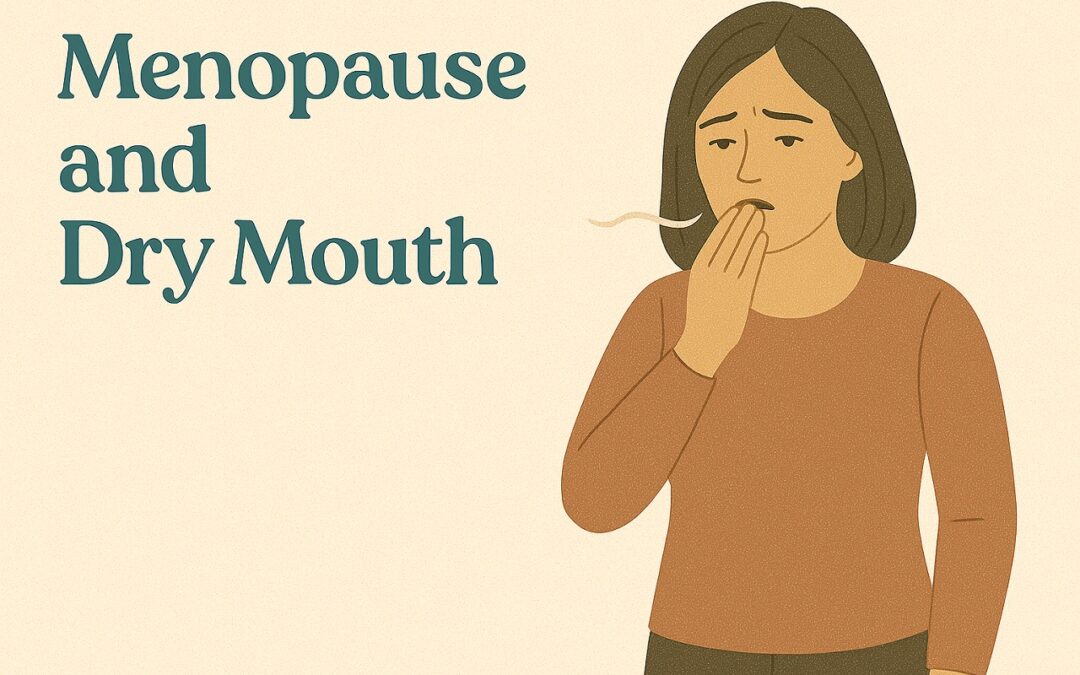Menopause affects every woman differently, but many share symptoms caused by changing hormone levels. While hot flashes, mood changes, and night sweats are frequently discussed, there are less recognized symptoms that deserve equal attention. One of these is xerostomia, or dry mouth, a condition marked by reduced saliva production.
The hormonal fluctuations of menopause, particularly the drop in estrogen, can impact salivary gland function. This page will explore the connection between menopause and dry mouth, examine causes and symptoms, and outline available treatment options.
What Is Xerostomia?
Definition
Xerostomia refers to a sensation of dryness in the mouth due to inadequate saliva. Saliva plays a critical role in oral and overall health. It helps lubricate the mouth, break down food, protect teeth from decay, and prevent infection by controlling bacteria and fungi.
When saliva production is reduced, the mouth becomes dry, which can cause discomfort and lead to complications affecting speaking, chewing, swallowing, and oral health.
Saliva’s Role in the Body
Saliva isn’t just moisture. It performs several vital functions, including:
- Washing away food particles and debris
- Neutralizing acids produced by bacteria
- Providing disease-fighting substances
- Aiding digestion by beginning the breakdown of food
- Protecting the mucosa of the mouth and throat
When saliva is lacking, the effects ripple across many systems.
Can Menopause Cause Dry Mouth?
Yes. Menopause can cause dry mouth. The main reason is declining estrogen levels, which affect many tissues in the body, including the salivary glands. As estrogen decreases, the glands produce less saliva, leading to dryness and discomfort.
Menopausal xerostomia may not occur in every woman, but it is common enough to be considered a notable symptom. Women experiencing it often report a persistent feeling of dryness, sore or burning tongue, difficulty swallowing, or a metallic taste in the mouth.
Causes of Menopausal Xerostomia
1. Hormonal Shifts
- Estrogen Decline: Estrogen helps regulate the function and sensitivity of various glands, including salivary glands. As estrogen levels drop, so does the stimulation of saliva production.
- Progesterone Changes: Though less studied than estrogen, falling progesterone levels may also play a role in changes to oral tissues.
2. Medications
Many women take medications during and after menopause to treat related conditions, and dry mouth is a common side effect. Medications that can contribute to xerostomia include:
- Antidepressants (SSRIs, SNRIs)
- Antihypertensives
- Antihistamines
- Hormone blockers (used in cancer treatment)
- Diuretics
3. Underlying Medical Conditions
Menopause may coincide with or exacerbate medical conditions that increase the risk of dry mouth:
- Sjögren’s Syndrome: An autoimmune condition causing damage to moisture-producing glands.
- Type 2 Diabetes: Blood sugar fluctuations can alter salivary output.
- Thyroid Disorders: Hypothyroidism is more common in postmenopausal women and can contribute to oral dryness.
4. Lifestyle and Environmental Factors
- Smoking or vaping
- High caffeine or alcohol consumption
- Dehydration due to low water intake or diuretic use
- Sleeping with an open mouth
- Use of indoor heating or cooling systems that reduce air humidity
Symptoms to Watch For
Dry mouth from menopause can present in several ways. Common symptoms include:
- Constant feeling of dryness or stickiness in the mouth
- Burning sensation on the tongue
- Cracked lips or corners of the mouth
- Sore throat or hoarseness
- Difficulty speaking or swallowing
- Dry nasal passages
- Altered taste or metallic taste
- Increased thirst
- Bad breath
If any of these symptoms persist, especially if they impact daily comfort or nutrition, they should be addressed with a medical professional.
Potential Complications
Untreated dry mouth can lead to several problems beyond discomfort:
- Dental Issues: Saliva protects teeth. Without it, the risk of cavities, enamel erosion, and gum disease increases.
- Oral Infections: Fungal infections like oral thrush are more likely in dry environments.
- Digestive Problems: Proper digestion begins in the mouth. Inadequate saliva impairs food breakdown and swallowing.
- Reduced Quality of Life: Constant dryness may cause irritability, sleep disruption, and decreased enjoyment of food.
Diagnosing Xerostomia
A healthcare provider can evaluate dry mouth through:
- A clinical oral examination
- Reviewing medications and medical history
- Salivary flow tests
- Blood work to screen for systemic causes
Discussing symptoms openly helps identify the cause and guide the appropriate course of treatment.
Treatment Options for Menopausal Dry Mouth
1. Hormone Replacement Therapy (HRT)
HRT may restore estrogen to levels that support normal salivary gland function. By targeting the root hormonal cause, HRT can reduce or even eliminate dry mouth symptoms for many women.
Amazing Meds offers bioidentical HRT programs to support balanced hormonal health. All treatments are tailored to individual needs and supervised by experienced medical professionals.
2. Prescription Medications
For more severe cases, doctors may prescribe:
- Pilocarpine: A muscarinic agonist that stimulates salivary secretion.
- Cevimeline: Targets receptors on salivary glands, increasing saliva output.
These medications are typically used when over-the-counter solutions are not effective.
3. Over-the-Counter Products
- Artificial saliva products
- Oral moisturizing sprays and rinses
- Xylitol-based gums or lozenges to stimulate natural saliva flow
- Fluoride toothpaste and mouth rinses to protect dental enamel
4. Lifestyle Modifications
Improving daily habits can ease symptoms significantly:
- Increase water intake, sipping frequently throughout the day
- Avoid tobacco and limit alcohol
- Reduce intake of salty or spicy foods
- Use a humidifier, especially at night
- Breathe through the nose instead of the mouth
- Chew sugar-free gum to activate salivary glands
5. Addressing Underlying Conditions
If an autoimmune disorder, thyroid dysfunction, or diabetes is contributing to dry mouth, managing the primary condition is essential. Hormonal support combined with disease-specific treatment often yields the best outcomes.
When to Seek Help
If dry mouth persists or causes pain, difficulty swallowing, changes in taste, or frequent dental problems, professional care is essential. Early treatment improves comfort and reduces the risk of long-term complications.
Amazing Meds provides expert support for menopausal health, including thorough assessments and tailored treatment plans that can address the root causes of dry mouth and other hormone-related symptoms.
Bringing Comfort Back to Your Day
Menopausal xerostomia is a real and often disruptive condition, but it is manageable with the right approach. Whether caused by hormonal changes, medications, or other underlying factors, dry mouth can be treated effectively through HRT, medications, and lifestyle changes.
If you’re experiencing dry mouth and suspect menopause may be the cause, Amazing Meds is here to help. Our dedicated team specializes in hormone replacement therapy, peptide therapy, and holistic health solutions tailored to your stage of life.Get the support you need to feel like yourself again. Explore your options with Amazing Meds and take the first step toward lasting relief.

